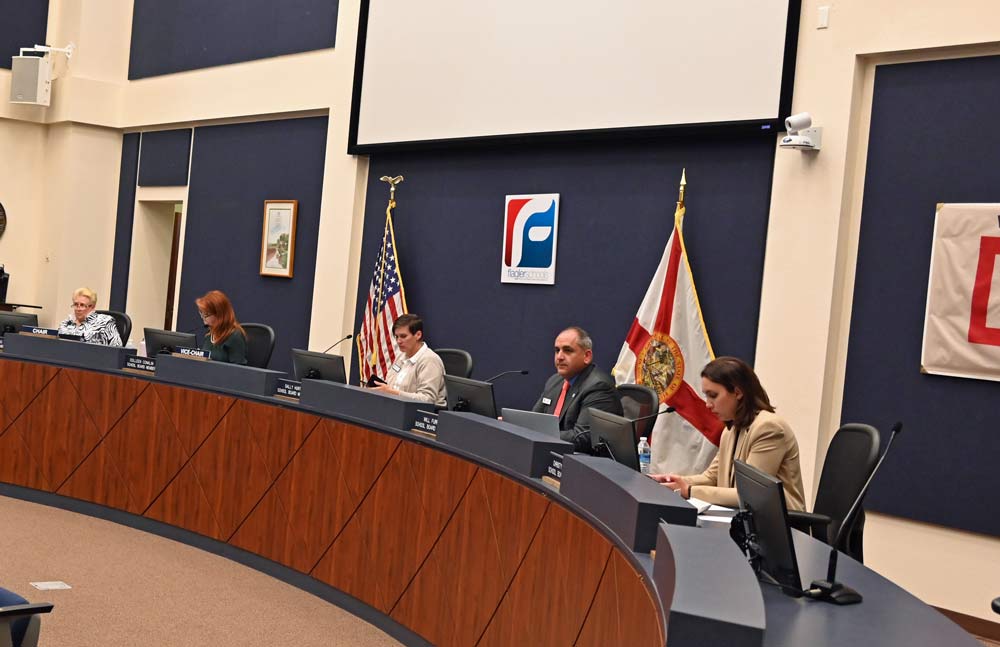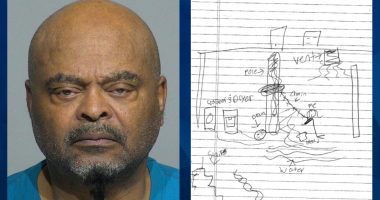
The Flagler County School Board is holding one of its most important public meetings of the year Thursday (Aug. 24), between 9 a.m. and noon, in the superintendent’s conference room on the third floor of the Government Services building. Misleadingly referring to it as a “retreat,” the board will hold an extended interview with Interim Superintendent LaShakia Moore to determine whether it should end its search for a permanent superintendent and appoint Moore in September.
Some members of the School Board would rather you did not know about the meeting, and did not attend. District officials are following their lead, dubbing the meeting a “retreat”–it is, in fact, a special workshop–keeping any information about it to a strict minimum, and of course making no plans to live-stream it, by audio or video, as all other meetings are, or even recording it.
The last “retreat” the board held a few weeks ago was not even announced on the web, and to some board members’ delight, drew no audience or media, and led School Board Chair Cheryl Massaro to wonder whether it was legal to hold it. It was held, because the meeting had been noticed on the cork board in the lobby of the GSB, which nobody looks at but counts as official notice in the mind of those who like such meetings kept in the shadows.
If you click on the notice about the Thursday “retreat” on the district’s website, it only gives the time of the meeting. No location, no described purpose, no agenda. There is no notice of the meeting on the “Board Docs” section of the website, where workshop and meeting agendas are detailed (at least there was none by the time this article initially published.)
There have been no announcement–on social media, on the website, or in press releases–about the meeting, even though it is part of the board’s most critical process and will lead to a decision wither way–to hire Moore or not. That decision will affect most segments of the community beyond the district’s 13,000 students, their families and 1,500 employees, the business community included.
Nor does the agenda for that Thursday workshop make any provision for public input, despite the public import of the discussion and the momentum in play: board members have made clear that it is at that meeting that they will vet Moore and decide whether to end the search and hire her.
The two-page agenda for the meeting, obtained by FlaglerLive on request, leaves no doubt as to its purpose. (See the agenda in full at the foot of the article.) It doesn’t list the place or time of the meeting, and lists only the five school board members, Moore and Gavin as “attendees,” again telegraphing insularity.
But it is a formal meeting in seven parts in which Moore will be asked about her vision for the district’s “strategic plan” (its goals), how she’ll handle community members, business and finance, and “What do you intend to accomplish in your first 100 days.” One of the segments will also focus on how Moore will handle communications. The questions have nothing to do with transparency with the community, only with relations with the board, which keeps hunting for a tighter lid on information even from its own members.
There will be direct questions: “What Strategies do you believe are missing from the current plan.” “What Achievement gaps have we missed.” “b) How will you engage the parents into the District’s mission and vision.” “What business model or fiscal practice do you believe the District could benefit from to maximize funding received.” “What strategies would you implement to assist departments and staff with determining cost saving measures.”
The agenda was presumably written before reporting uncovered the Bunnell Elementary scandal involving the segregated lecturing to the school’s Black students last Friday as “problems” who must raise their standardized test scores and compete for fried chicken at Chick-fil-A for the privilege. But it’s difficult to imagine that the matter won’t be discussed: there is a sub-item in Thursday’s meeting focusing on “Education Equity,” with a parenthesis of bewildering acronyms: “(SWD, African-American, ELL and FRL).” In English: Students with disabilities, English language learners (students for whom English is not necessarily the first language), Free reduced lunch (the poor).
Moore, at board members’ request, also submitted a resume and a cover letter. The newer resume has been considerably polished and expanded since the two-page version she’d submitted five years ago when she was named principal at Rymfire Elementary, when her top achievement had been as a curriculum specialist. The newer resume is twice the length, top-loaded with her far greater responsibilities–principal, director of teaching and learning, assistant superintendent, and now interim superintendent. (See the resume here.)
If there was any doubt as to Moore’s willingness to take on the superintendent’s job permanently, she removed them. “Through the various roles that I have held here in Flagler schools, I have demonstrated a consistent commitment to fostering collaboration with all stakeholders, delivering high quality work and driving operational efficiency, making me uniquely qualified for this pivotal role,” she wrote the board members. “I am well versed in the intricacies of our operations and have consistently demonstrated a proactive approach to problem solving. These skills are needed as we navigate through not only a change in leadership but a rapidly changing educational landscape.”
Read Related Also: Boxer convicted of luring pregnant lover to his car to punch her, drug her, tie her up with metal wire and throw her off bridge
The one-page letter is short on specifics, hewing to boosting generalities and reflecting the subtext of Thursday’s meeting: you can grill me for three hours, Moore seems to say. She does not shirk a challenge. She also does not suffer fools: she will be interviewing board members as much as they will be interviewing her. Like Cathy Mittlestadt, her predecessor who elevated her to assistant superintendent, Moore doesn’t do chummy, she doesn’t needlessly flatter (or get taken by flattery), and she doesn’t do good-ol’ boy small talk. Unlike Mittlestadt, Moore’s personality is more broadly congenial and at ease the more she trusts those around her, though that trust isn’t easily gained, and she’s in her element whether in a sea of kids, in an office suite or in front of the weird and unpredictable motley crew that the Flagler County School Board has become.
“In my current role as interim superintendent,” Moore concluded, “I have begun much of the work that is needed to improve academic achievement, stabilize the workforce and improve community engagement. My track record of delivering results and fostering positive working relationships has allowed me to build strong rapport with our faculty, staff, students, families and this community.”
A three-hour interview with the potential superintendent of the school district is anything but a “retreat.” But that’s how the board chose to portray the meeting when it agreed to schedule it for Thursday at its last workshop, when it also flirted with “executive sessions,” or closed-door meetings.
Hunt, the school board member who seems fond of closed-door, “executive sessions,” had wondered in the same meeting “if we need to schedule another executive session” to discuss school finances (that would be illegal), and almost a year into her tenure, she was still claiming that “I don’t really want to discuss it too much here because I don’t know what I can discuss here and what I have to discuss an executive session.”
It was alarming at one point in that same meeting that even Moore referred to a discussion of “finance and safety” as both being “what we agreed to come back into executive session with.” If the superintendent and her staff are discussing finances in any way beyond the scope of how, say, teacher or employee contracts might affect the numbers, then they are breaking the law. (The district appears to be having financial issues that are impacting its union negotiations.)
The law is, in fact, very clear: Board members themselves don’t pick and choose what they discuss behind closed door, and don’t even schedule such meetings. The only time such meetings are allowed under Florida’s open meetings law is when the board needs to discuss pending litigation, when the board needs to discuss strategy ahead of collective bargaining negotiations with its teacher and employee unions, and when it needs to be appraised of very specific, tactical security measures (not security in general), revealing which would compromise campus security. That’s it. They are also barred by law from taking any vote or polling votes behind closed doors.
And it isn’t board members who initiate closed-door sessions, since they are not generally aware of issues that compel such meetings, but the superintendent and the board attorney, Kristy Gavin, the latter responsible for ensuring that board members follow the law during meetings.
They may not discuss personnel matters behind closed doors, including the fate of the superintendent or any other employee. They may not discuss any other board matters, including issues between themselves. They may not discuss contracts, conflicts, policies or regulations or any other matter, unless they do so in open session. If they are discussing any such matters behind closed doors, they are breaking the law, and those taking part are complicit. (In the past, they regularly held closed-door sessions to discuss the expulsion of students, but that has become an administrative matter as expulsions have taken on a different form, with home-based or alternative education continuing.)
Nevertheless, the words “executive session” keep dropping from Hunt’s and Will Furry’s mouths with alarming regularity. “I’m thinking that it might be prudent for us to have either an executive session or just a special meeting that we can really sit down and then make a decisive decision” regarding Moore, Furry said at an August 15 workshop.
“We cannot do an executive session, we do have to operate in the sunshine,” Gavin reminded the board after Furry floated the idea. Yet moments later, as the discussion about a meeting to discuss Moore’s future solidified, Hunt was literally referring to a “back room” as her preferred venue for such a meeting: “I think we can all agree when we are in the back room, meaning together, it is a cohesive it is a cooperative collaborative board. We’re able to speak freely.” Obviously, it’s not clear how often Hunt and the board have found themselves in “back rooms.”
Hunt added: “I personally would prefer that we do not wait to have that conversation until, like, the vote, because then it just becomes about the vote and not five colleagues coming together and having a really nice conversation.”
![]()
LaShakia Moore Resume (1) (1)









